Abstract
1. The mechanism(s) involved in the mobilization of calcium induced by arachidonic acid in human neutrophils was investigated. 2. The addition of arachidonic acid to a suspension of human neutrophils led to a time- and concentration-dependent mobilization of calcium which was the result of two separate and experimentally differentiable processes. The latter consisted of a rapid and transient phase followed by a slower and more sustained response. 3. The initial phase of calcium mobilization elicited by arachidonic acid was decreased in the presence of EGTA, inhibited by pertussis toxin as well as by nordihydroguaiaretic acid (NDGA), and diminished following a pre-incubation with leukotriene B4, but not platelet-activating factor. 4. The characteristics of the first phase of the mobilization of calcium were consistent with an interaction of the fatty acid with the leukotriene B4 receptors, either directly or indirectly following the synthesis of leukotriene B4, as well as with a release of internal calcium. 5. The second, slower and more sustained phase of calcium mobilization was more apparent at high concentrations (greater than or equal to 8-16 microM) of arachidonic acid, and was relatively insensitive to pertussis toxin, EGTA or NDGA. 6. The characteristics of the 'slow' phase of calcium mobilization by arachidonic acid are consistent with its being associated primarily with a release of calcium from internal storage pools. 7. The data presented indicate that the mechanism of mobilization of calcium by arachidonic acid in human neutrophils is complex and involves specific activation pathways employed, in part at least, by other neutrophil agonists.(ABSTRACT TRUNCATED AT 250 WORDS)
Full text
PDF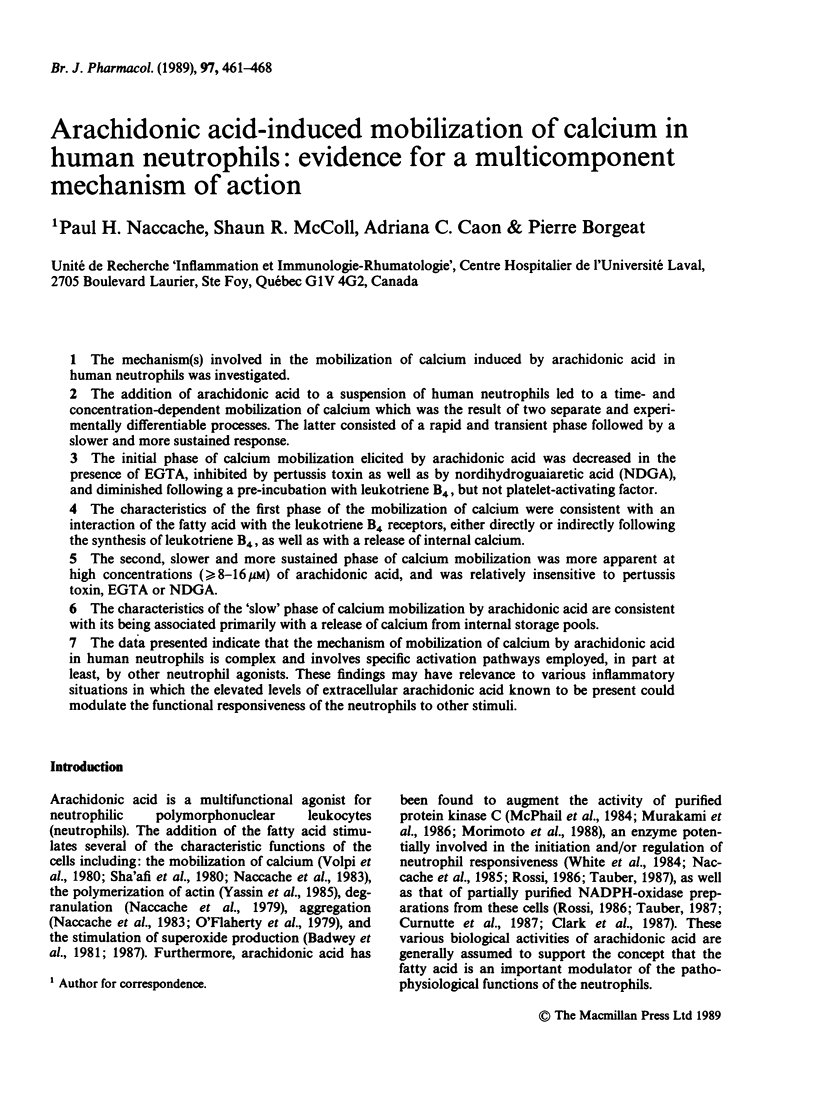
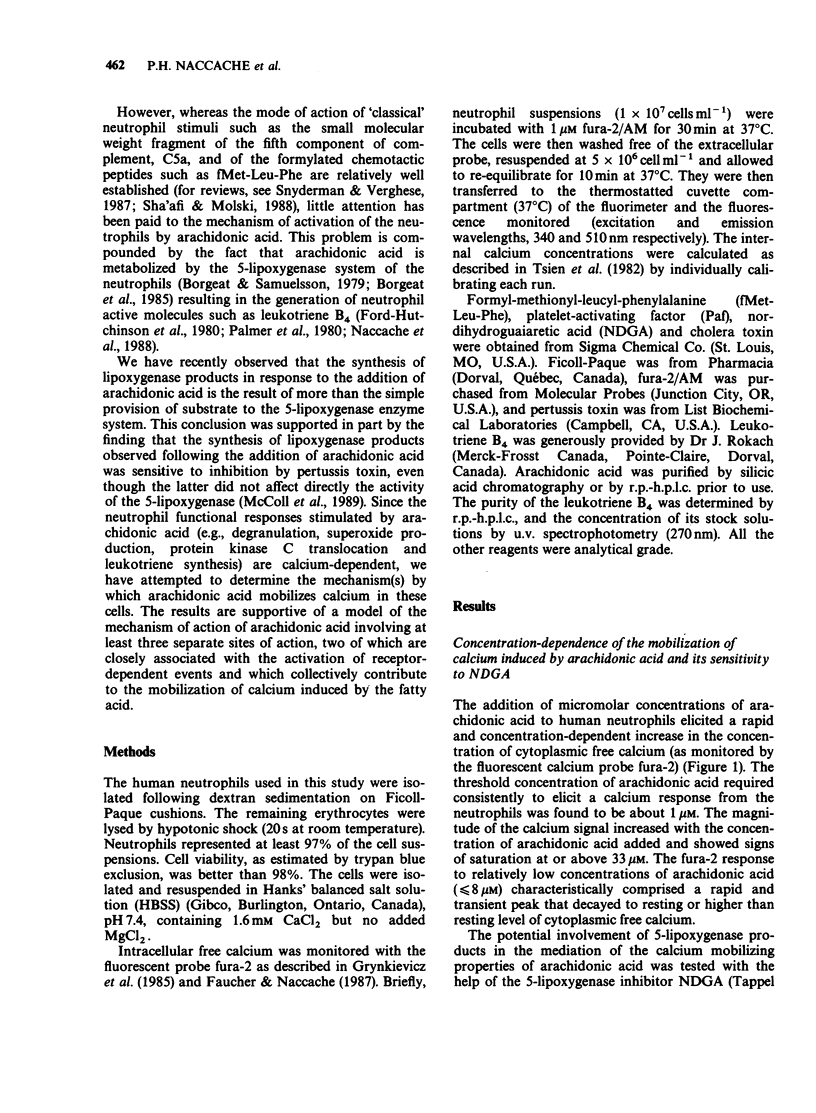
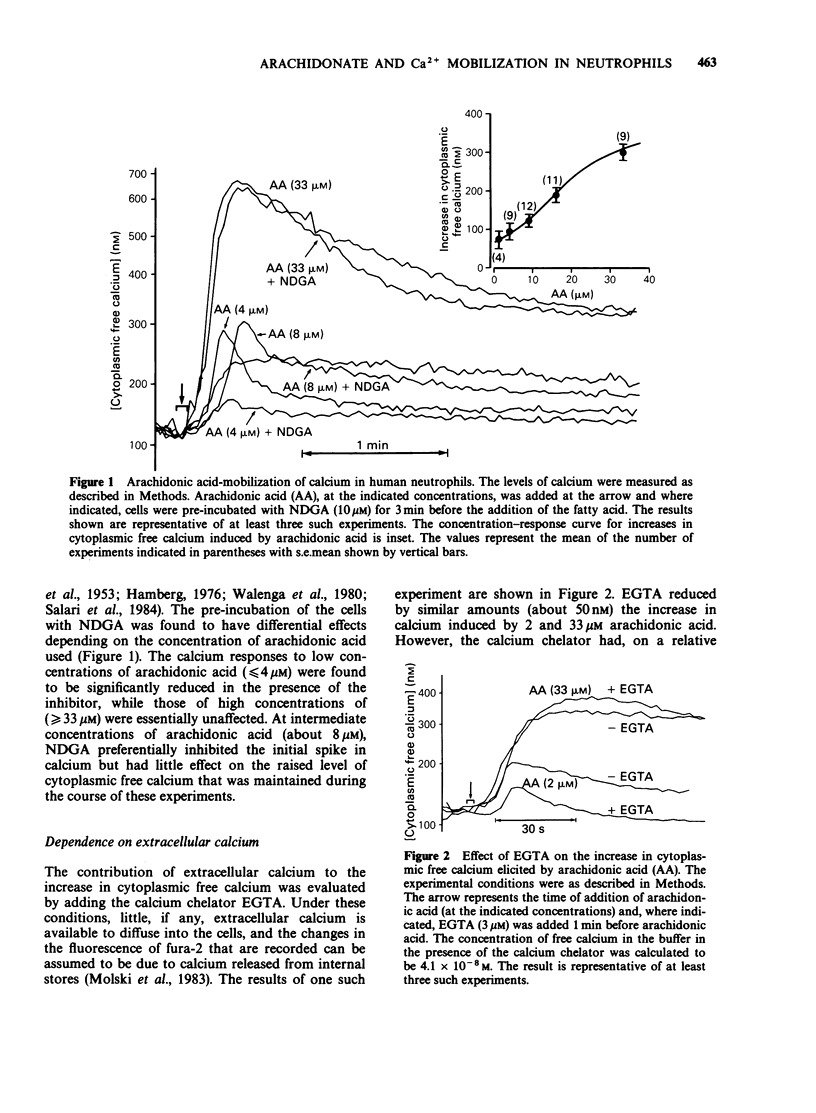
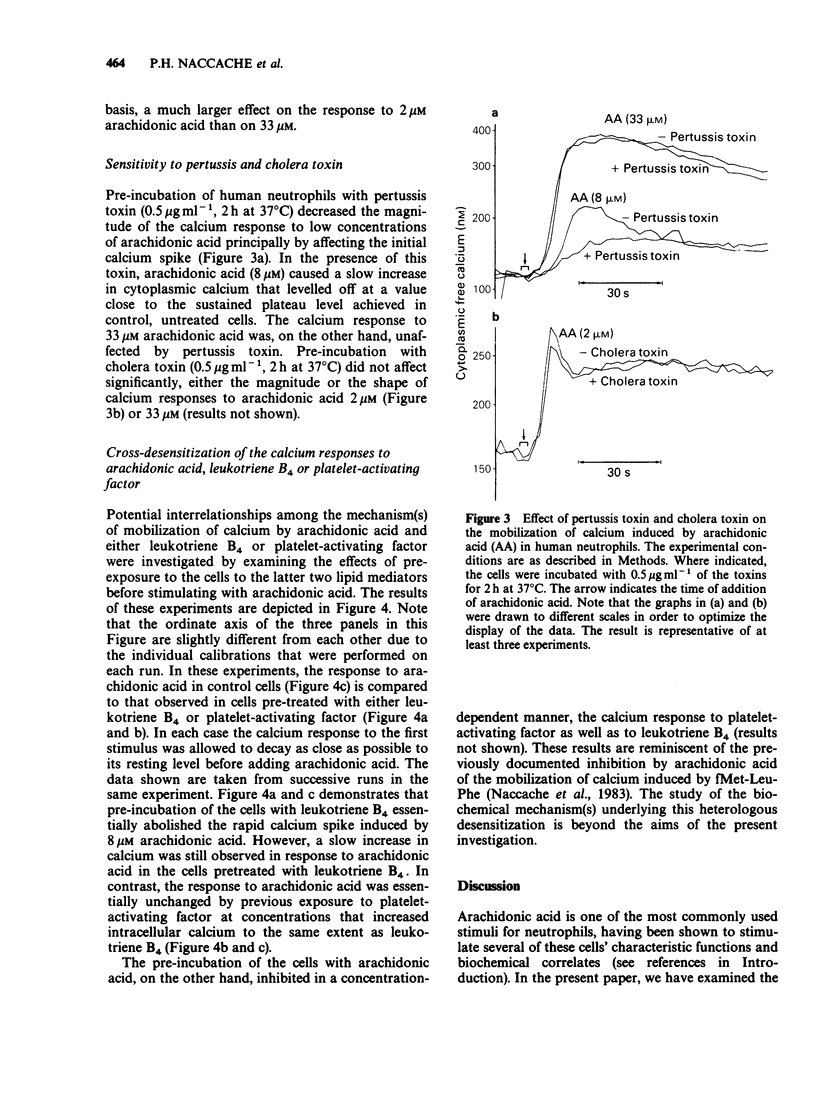
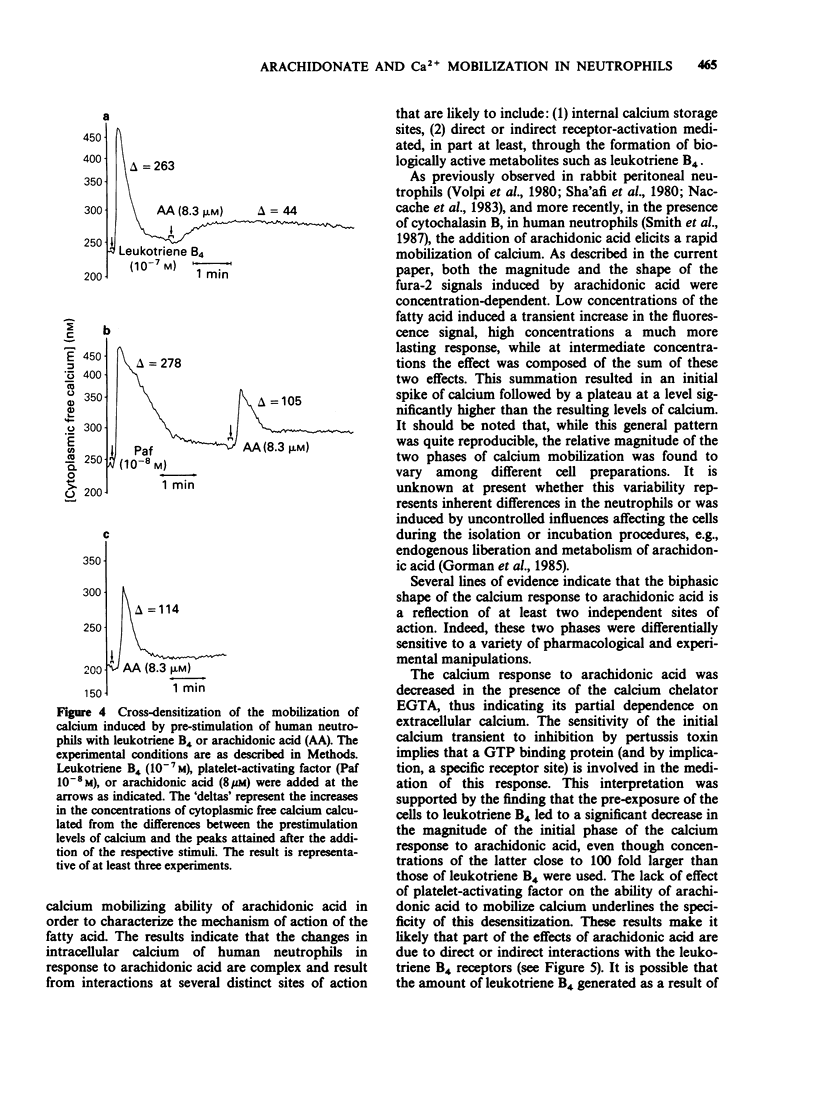
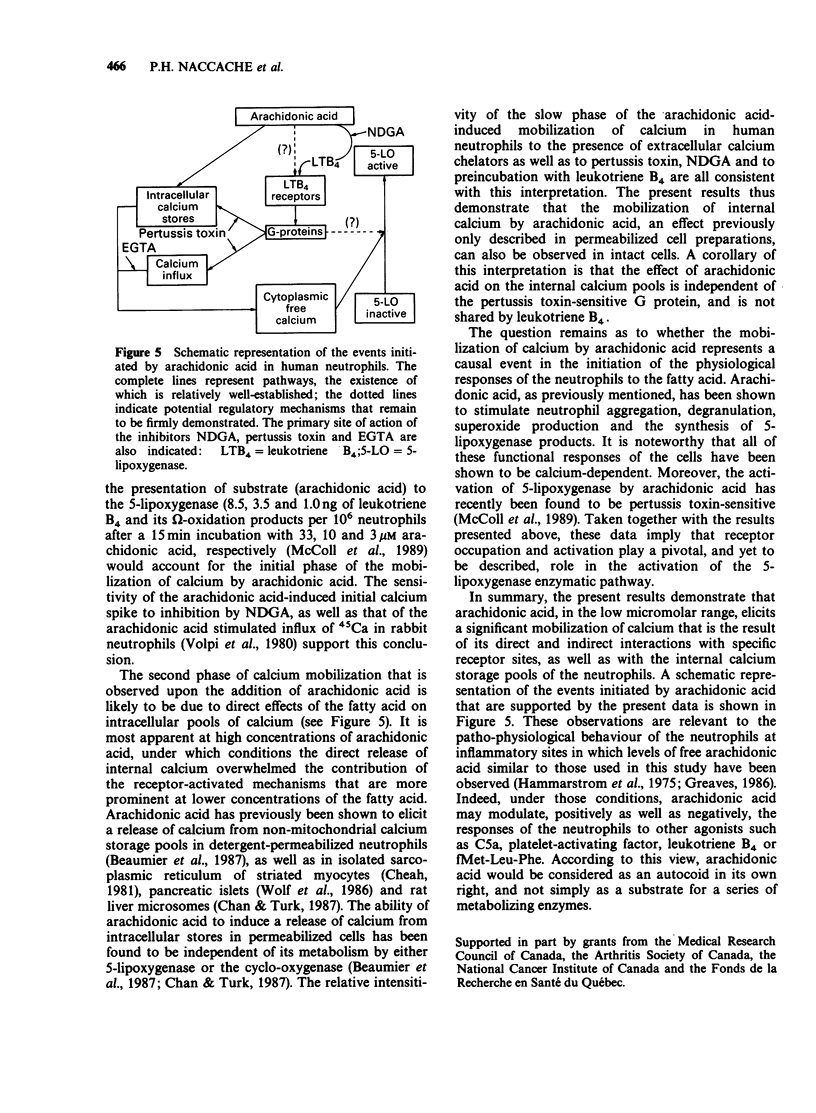
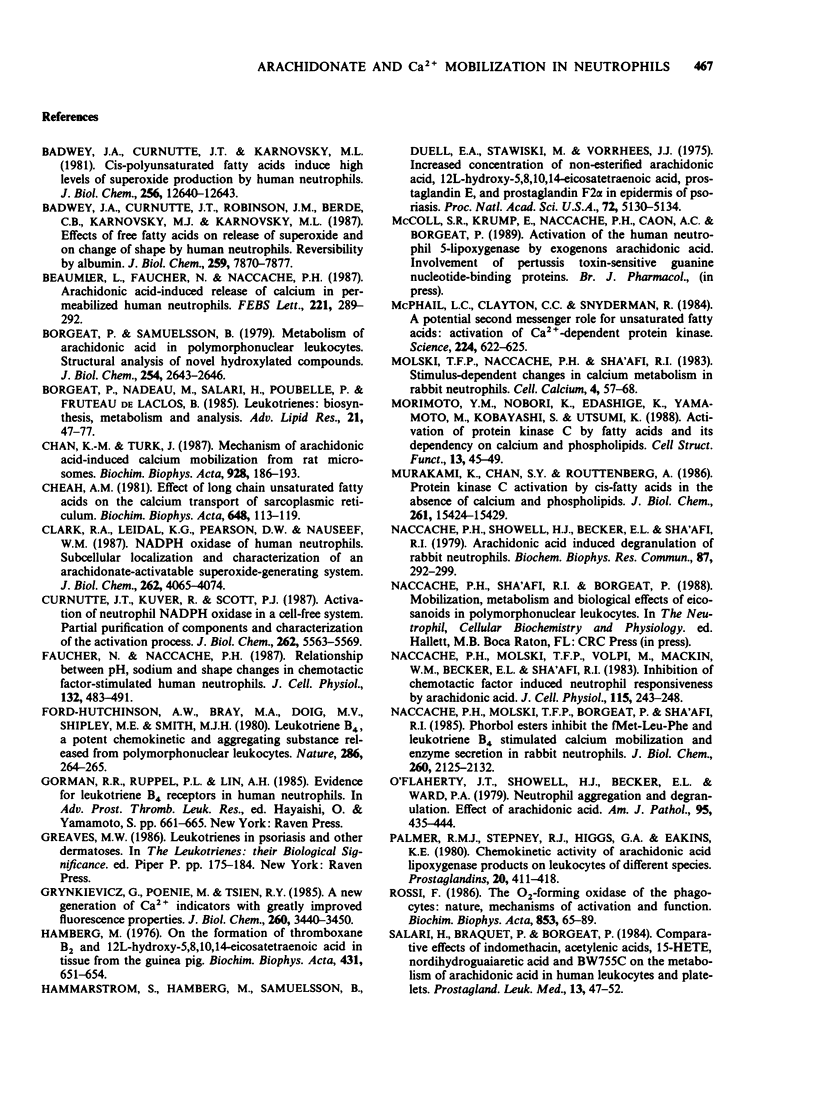
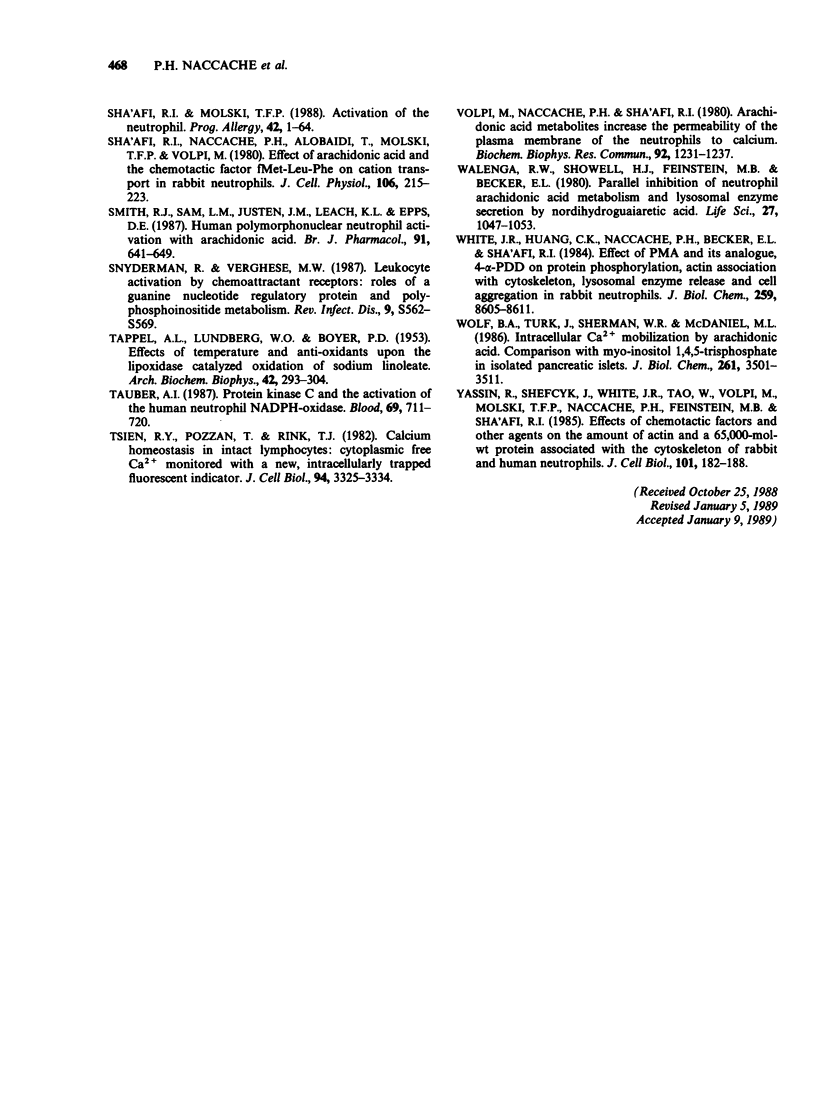
Selected References
These references are in PubMed. This may not be the complete list of references from this article.
- Badwey J. A., Curnutte J. T., Karnovsky M. L. cis-Polyunsaturated fatty acids induce high levels of superoxide production by human neutrophils. J Biol Chem. 1981 Dec 25;256(24):12640–12643. [PubMed] [Google Scholar]
- Badwey J. A., Curnutte J. T., Robinson J. M., Berde C. B., Karnovsky M. J., Karnovsky M. L. Effects of free fatty acids on release of superoxide and on change of shape by human neutrophils. Reversibility by albumin. J Biol Chem. 1984 Jun 25;259(12):7870–7877. [PubMed] [Google Scholar]
- Beaumier L., Faucher N., Naccache P. H. Arachidonic acid-induced release of calcium in permeabilized human neutrophils. FEBS Lett. 1987 Sep 14;221(2):289–292. doi: 10.1016/0014-5793(87)80942-0. [DOI] [PubMed] [Google Scholar]
- Borgeat P., Nadeau M., Salari H., Poubelle P., Fruteau de Laclos B. Leukotrienes: biosynthesis, metabolism, and analysis. Adv Lipid Res. 1985;21:47–77. doi: 10.1016/b978-0-12-024921-3.50008-3. [DOI] [PubMed] [Google Scholar]
- Borgeat P., Samuelsson B. Transformation of arachidonic acid by rabbit polymorphonuclear leukocytes. Formation of a novel dihydroxyeicosatetraenoic acid. J Biol Chem. 1979 Apr 25;254(8):2643–2646. [PubMed] [Google Scholar]
- Chan K. M., Turk J. Mechanism of arachidonic acid-induced Ca2+ mobilization from rat liver microsomes. Biochim Biophys Acta. 1987 Apr 22;928(2):186–193. doi: 10.1016/0167-4889(87)90120-0. [DOI] [PubMed] [Google Scholar]
- Cheah A. M. Effect of long chain unsaturated fatty acids on the calcium transport of sarcoplasmic reticulum. Biochim Biophys Acta. 1981 Nov 6;648(2):113–119. doi: 10.1016/0005-2736(81)90025-0. [DOI] [PubMed] [Google Scholar]
- Clark R. A., Leidal K. G., Pearson D. W., Nauseef W. M. NADPH oxidase of human neutrophils. Subcellular localization and characterization of an arachidonate-activatable superoxide-generating system. J Biol Chem. 1987 Mar 25;262(9):4065–4074. [PubMed] [Google Scholar]
- Curnutte J. T., Kuver R., Scott P. J. Activation of neutrophil NADPH oxidase in a cell-free system. Partial purification of components and characterization of the activation process. J Biol Chem. 1987 Apr 25;262(12):5563–5569. [PubMed] [Google Scholar]
- Faucher N., Naccache P. H. Relationship between pH, sodium, and shape changes in chemotactic-factor-stimulated human neutrophils. J Cell Physiol. 1987 Sep;132(3):483–491. doi: 10.1002/jcp.1041320310. [DOI] [PubMed] [Google Scholar]
- Ford-Hutchinson A. W., Bray M. A., Doig M. V., Shipley M. E., Smith M. J. Leukotriene B, a potent chemokinetic and aggregating substance released from polymorphonuclear leukocytes. Nature. 1980 Jul 17;286(5770):264–265. doi: 10.1038/286264a0. [DOI] [PubMed] [Google Scholar]
- Gorman R. R., Ruppel P. L., Lin A. H. Evidence for leukotriene B4 receptors in human neutrophils. Adv Prostaglandin Thromboxane Leukot Res. 1985;15:661–665. [PubMed] [Google Scholar]
- Grynkiewicz G., Poenie M., Tsien R. Y. A new generation of Ca2+ indicators with greatly improved fluorescence properties. J Biol Chem. 1985 Mar 25;260(6):3440–3450. [PubMed] [Google Scholar]
- Hamberg M. On the formation of thromboxane B2 and 12l-hydroxy-5,8,10,14-eicosatetraenoic acid (12 ho-20:4) in tissues from the guinea pig. Biochim Biophys Acta. 1976 Jun 22;431(3):651–654. doi: 10.1016/0005-2760(76)90232-0. [DOI] [PubMed] [Google Scholar]
- Hammarström S., Hamberg M., Samuelsson B., Duell E. A., Stawiski M., Voorhees J. J. Increased concentrations of nonesterified arachidonic acid, 12L-hydroxy-5,8,10,14-eicosatetraenoic acid, prostaglandin E2, and prostaglandin F2alpha in epidermis of psoriasis. Proc Natl Acad Sci U S A. 1975 Dec;72(12):5130–5134. doi: 10.1073/pnas.72.12.5130. [DOI] [PMC free article] [PubMed] [Google Scholar]
- McPhail L. C., Clayton C. C., Snyderman R. A potential second messenger role for unsaturated fatty acids: activation of Ca2+-dependent protein kinase. Science. 1984 May 11;224(4649):622–625. doi: 10.1126/science.6231726. [DOI] [PubMed] [Google Scholar]
- Molski T. F., Naccache P. H., Sha'afi R. I. Stimulus-dependent changes in calcium metabolism in rabbit neutrophils. Cell Calcium. 1983 Feb;4(1):57–68. doi: 10.1016/0143-4160(83)90049-0. [DOI] [PubMed] [Google Scholar]
- Morimoto Y. M., Nobori K., Edashige K., Yamamoto M., Kobayashi S., Utsumi K. Activation of protein kinase C by fatty acids and its dependency on Ca2+ and phospholipid. Cell Struct Funct. 1988 Feb;13(1):45–49. doi: 10.1247/csf.13.45. [DOI] [PubMed] [Google Scholar]
- Murakami K., Chan S. Y., Routtenberg A. Protein kinase C activation by cis-fatty acid in the absence of Ca2+ and phospholipids. J Biol Chem. 1986 Nov 25;261(33):15424–15429. [PubMed] [Google Scholar]
- Naccache P. H., Molski T. F., Borgeat P., White J. R., Sha'afi R. I. Phorbol esters inhibit the fMet-Leu-Phe- and leukotriene B4-stimulated calcium mobilization and enzyme secretion in rabbit neutrophils. J Biol Chem. 1985 Feb 25;260(4):2125–2131. [PubMed] [Google Scholar]
- Naccache P. H., Molski T. F., Volpi M., Mackin W. M., Becker E. L., Sha'afi R. I. Inhibition of chemotactic factor-induced neutrophil responsiveness by arachidonic acid. J Cell Physiol. 1983 Jun;115(3):243–248. doi: 10.1002/jcp.1041150305. [DOI] [PubMed] [Google Scholar]
- Naccache P. H., Showell H. J., Becker E. L., Sha'afi R. I. Arachidonic acid induced degranulation of rabbit peritoneal neutrophils. Biochem Biophys Res Commun. 1979 Mar 15;87(1):292–299. doi: 10.1016/0006-291x(79)91678-4. [DOI] [PubMed] [Google Scholar]
- Palmer R. M., Stepney R. J., Higgs G. A., Eakins K. E. Chemokinetic activity of arachidonic and lipoxygenase products on leuocyctes of different species. Prostaglandins. 1980 Aug;20(2):411–418. doi: 10.1016/s0090-6980(80)80058-x. [DOI] [PubMed] [Google Scholar]
- Rossi F. The O2- -forming NADPH oxidase of the phagocytes: nature, mechanisms of activation and function. Biochim Biophys Acta. 1986 Nov 4;853(1):65–89. doi: 10.1016/0304-4173(86)90005-4. [DOI] [PubMed] [Google Scholar]
- Sha'afi R. I., Molski T. F. Activation of the neutrophil. Prog Allergy. 1988;42:1–64. doi: 10.1159/000318681. [DOI] [PubMed] [Google Scholar]
- Sha'afi R. I., Naccache P. H., Alobaidi T., Molski T. F., Volpi M. Effect of arachidonic acid and the chemotactic factor F-Met-Leu-Phe on cation transport in rabbit neutrophils. J Cell Physiol. 1981 Feb;106(2):215–223. doi: 10.1002/jcp.1041060207. [DOI] [PubMed] [Google Scholar]
- Smith R. J., Sam L. M., Justen J. M., Leach K. L., Epps D. E. Human polymorphonuclear neutrophil activation with arachidonic acid. Br J Pharmacol. 1987 Jul;91(3):641–649. doi: 10.1111/j.1476-5381.1987.tb11258.x. [DOI] [PMC free article] [PubMed] [Google Scholar]
- Snyderman R., Verghese M. W. Leukocyte activation by chemoattractant receptors: roles of a guanine nucleotide regulatory protein and polyphosphoinositide metabolism. Rev Infect Dis. 1987 Sep-Oct;9 (Suppl 5):S562–S569. doi: 10.1093/clinids/9.supplement_5.s562. [DOI] [PubMed] [Google Scholar]
- TAPPEL A. L., LUNDBERG W. O., BOYER P. D. Effect of temperature and antioxidants upon the lipoxidase-catalyzed oxidation of sodium linoleate. Arch Biochem Biophys. 1953 Feb;42(2):293–304. doi: 10.1016/0003-9861(53)90359-2. [DOI] [PubMed] [Google Scholar]
- Tauber A. I. Protein kinase C and the activation of the human neutrophil NADPH-oxidase. Blood. 1987 Mar;69(3):711–720. [PubMed] [Google Scholar]
- Volpi M., Naccache P. H., Sha'afi R. I. Arachidonate metabolite(s) increase the permeability of the plasma membrane of the neutrophils to calcium. Biochem Biophys Res Commun. 1980 Feb 27;92(4):1231–1237. doi: 10.1016/0006-291x(80)90418-0. [DOI] [PubMed] [Google Scholar]
- Walenga R. W., Showell H. J., Feinstein M. B., Becker E. L. Parallel inhibition of neutrophil arachidonic acid metabolism and lysosomal enzyme secretion by nordihydroguaiaretic acid. Life Sci. 1980 Sep 22;27(12):1047–1053. doi: 10.1016/0024-3205(80)90028-4. [DOI] [PubMed] [Google Scholar]
- White J. R., Huang C. K., Hill J. M., Jr, Naccache P. H., Becker E. L., Sha'afi R. I. Effect of phorbol 12-myristate 13-acetate and its analogue 4 alpha-phorbol 12,13-didecanoate on protein phosphorylation and lysosomal enzyme release in rabbit neutrophils. J Biol Chem. 1984 Jul 10;259(13):8605–8611. [PubMed] [Google Scholar]
- Wolf B. A., Turk J., Sherman W. R., McDaniel M. L. Intracellular Ca2+ mobilization by arachidonic acid. Comparison with myo-inositol 1,4,5-trisphosphate in isolated pancreatic islets. J Biol Chem. 1986 Mar 15;261(8):3501–3511. [PubMed] [Google Scholar]
- Yassin R., Shefcyk J., White J. R., Tao W., Volpi M., Molski T. F., Naccache P. H., Feinstein M. B., Sha'afi R. I. Effects of chemotactic factors and other agents on the amounts of actin and a 65,000-mol-wt protein associated with the cytoskeleton of rabbit and human neutrophils. J Cell Biol. 1985 Jul;101(1):182–188. doi: 10.1083/jcb.101.1.182. [DOI] [PMC free article] [PubMed] [Google Scholar]


